
Rejuvenating early childhood development in the Kyrgyz Republic: The female entrepreneurs blazing a trail
Through a pilot project funded by USAID, AKF is supporting 75 women to establish and manage their own home-based ECD centres

In the Kyrgyz Republic’s urban areas, only 34% of children attend kindergarten, whilst in rural areas the number is even lower at 20%. Despite proactive measures by the government, such as reinstating state-owned kindergarten buildings into functional kindergartens, offering tax incentives, and simplifying licensing procedures, the number of Early Childhood Development (ECD) facilities in the country is the same as it was in 1990, despite the population growing by more than 50%.
In some parts of the country, teachers have been taking things into their own hands to deliver ECD services to their communities. In the southern Alay district, Cholpon Kydyrbaeva (pictured above), a language teacher from a small village school has been offering private lessons to children because there is no ECD centre in her village. She used to live in a courtyard with two houses, one small and one large. She decided to move her family into the smaller house and repurpose the larger one as an ECD centre.
Most private ECD centres typically operate in private houses repurposed like this to meet state requirements. However, almost all women entrepreneurs running private ECD centres like Cholpon’s struggle with licensing and financial sustainability.
Cholpon didn’t apply for a license because she didn’t consider her ECD centre a formal establishment. She had no formal training in ECD and lacked access to curriculum materials. Despite running the centre without making any profits or expansions, Cholpon remains undeterred. Cholpon says, “My motivation to keep the centre running is to see the smiling faces of children every morning and have an opportunity to contribute to the well-being of my community.”
My motivation to keep the centre running is to see the smiling faces of children every morning and have an opportunity to contribute to the well-being of my community.Cholpon – teacher and ECD centre entrepreneur
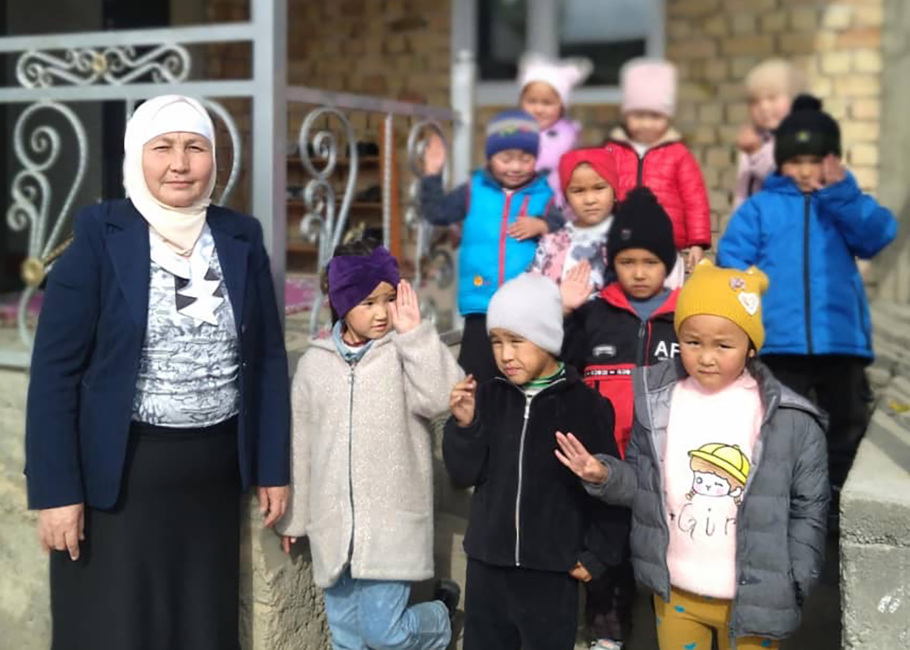
Cholpon runs an ECD centre from her own home, welcoming young learners to have the best possible start in life.
Access to ECD services is intrinsically linked to the social and economic role of women – whether as caregivers at home or teachers at kindergartens. With an already widening gender employment gap, 38% of employed women leave the workforce due to the scarcity of reliable ECD services. By investing in quality ECD services, we can both improve child wellbeing whilst also enabling women to find and keep jobs and contribute to the economy.
Over the past few years, the Aga Khan Foundation (AKF) team in Kyrgyz Republic has been working with communities to try to find a solution to the dual challenge of female unemployment and a lack of ECD services.
Using Human-Centred Design (HCD), the team engaged with over fifty aspiring women entrepreneurs, Ministry of Education representatives, and the Association of Private ECD Centres to understand the aspirations and barriers of opening an ECD centre.
HCD is a creative approach to problem solving which places people at the centre of the development process, leading to more tailored and responsive solutions. The approach is a core component of AKF’s work with communities and partners.
After identifying the key research insights, the team organised several co-design workshops with teachers, caregivers, entrepreneurs and other stakeholders. Sarayu Agarwal, Project Consultant and lead designer for the initiative, shares, “Many members of the team were skeptical of the HCD approach at first. When we were testing ideas in the community, they were afraid to create expectations before we could be certain of the solution implementation. The iterative nature of the process demands some patience, too, as many of the first few ideas received unfavorable feedback and required the team to pivot.”
However, the HCD process eventually inspired the solution: the Baktyluu Bala initiative which means ‘happy child’ in English. The solution draws on a four-fold approach to support women entrepreneurs in establishing quality ECD centres. Baktyluu Bala aims to:
- Develop an ECD startup kit with resources in pedagogy curriculum, business development, and licensing
- Strengthen the capacity of women entrepreneurs through ECD, licensing, and entrepreneurial training
- Provide seed grants to jumpstart ECD centre establishment in rural and semi-urban areas
- Mobilise a network of private ECD centres for cooperation, mentorship, and community support
Powered by a $100k fund under Local Impact – a partnership between USAID and AKF – the team piloted Baktyluu Bala for 12 months in the Osh, Jalal-Abad, and Naryn regions. During this period, the team worked with international and regional experts to develop comprehensive modules for the ECD startup kit, trained 100 women, and provided 11 of them with a $3,000 seed grant to initiate the opening of an ECD centre.
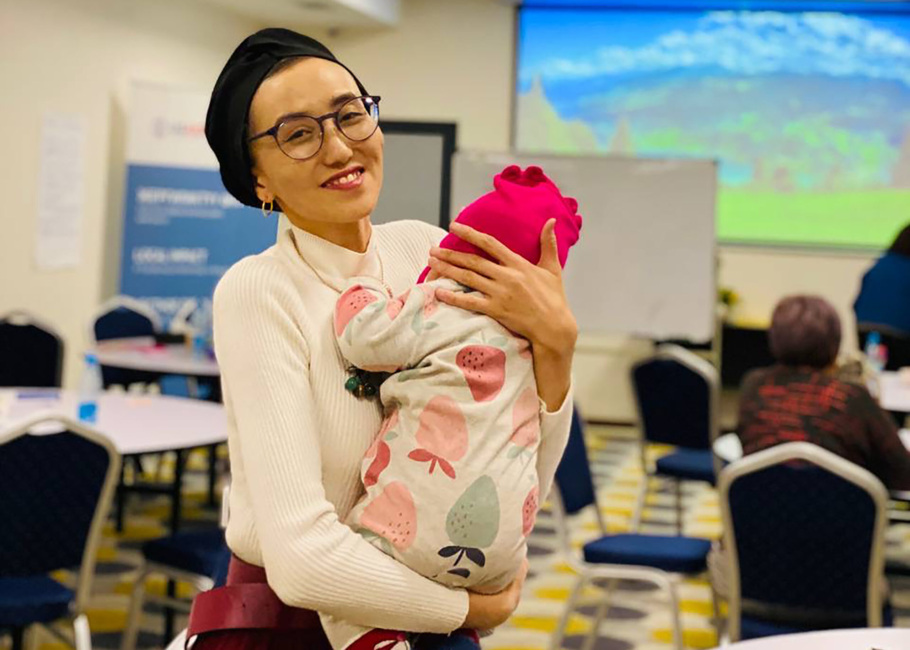
Shirin Zholdoshbek Kyzy was able to participate in the training whilst also caring for her young child.
Shirin Zholdoshbek Kyzy, a 28-year-old woman from Naryn, heard about Baktyluu Bala shortly after giving birth to her second child. After getting married, she moved to the At-Bashy village and had dreamt of opening the first ECD centre in the village. With no prior training as a teacher or entrepreneur, Shirin was very hesitant to apply. “While I was participating in intensive week-long training, my husband traveled and stayed with me at the training venue to care for our baby so I could breastfeed during breaks. I am so happy about the decision to participate because now I have my own ECD centre.”
While I was participating in intensive week-long training, my husband traveled and stayed with me at the training venue to care for our baby so I could breastfeed during breaks. I am so happy about the decision to participate because now I have my own ECD centre.Shirin – training participant and ECD centre entrepreneur
Adel Sultanbekova, lead coordinator of the pilot, says “The provision of childcare support during the training sessions was a very important consideration. Many of the participating women were young mothers with infants or toddlers and little familial support at home.”
Within three weeks of the launch, 457 women applied to participate in the pilot programme. After careful consideration, 75 women were selected. Among all the women who enrolled in the training, 80% successfully completed all training modules. As of November 2023, 14 private ECD centres have opened in the Kyrgyz Republic, supporting a total of 567 students aged 3-7 years.
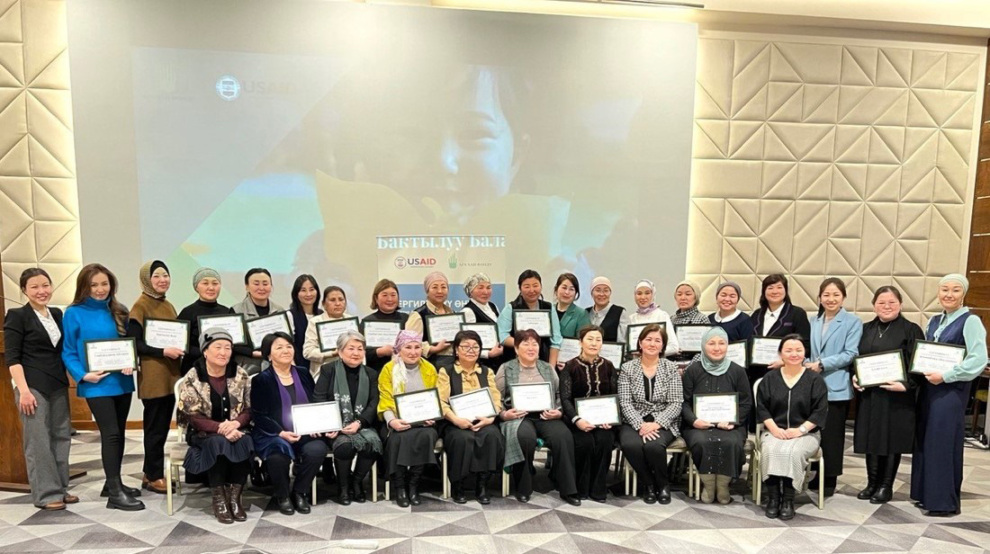
Some of the entrepreneurs gathered at the closing ceremony of the project to received their certifications.
The success and impact of the pilot programme has led to further investment from USAID and AKF within the framework of Local Impact. Under the new name of WE CARE, the $3 million initiative was launched in October 2023 and aims to enhance access to quality development and education services for children while fostering economic opportunities for women entrepreneurs through the establishment of early childhood development centres.
Local Impact is a $150m multi-year, multi-sector, and multi-country global partnership between AKF and USAID for meaningful, sustained impact across Asia and Africa. It is a five-year Leader with Associates (LWA) cooperative agreement that allows USAID to work with AKF and its partners to design and implement projects that address development challenges across sectors. Drawing on human-centered design tools and processes, Local Impact will spark new, innovative solutions to complex problems while tapping into existing productive efforts to address these issues at the grassroots level.
For more information, visit: www.akfusa.org/local-impact
This article is made possible by the generous support of the American people through the United States Agency for International Development (USAID). The contents are the responsibility of the Aga Khan Foundation and do not necessarily reflect the views of USAID or the United States Government.

Related News & Stories


AKF USA Atlanta Walk & Run 2024

AKF USA Atlanta Golf Tournament 2024
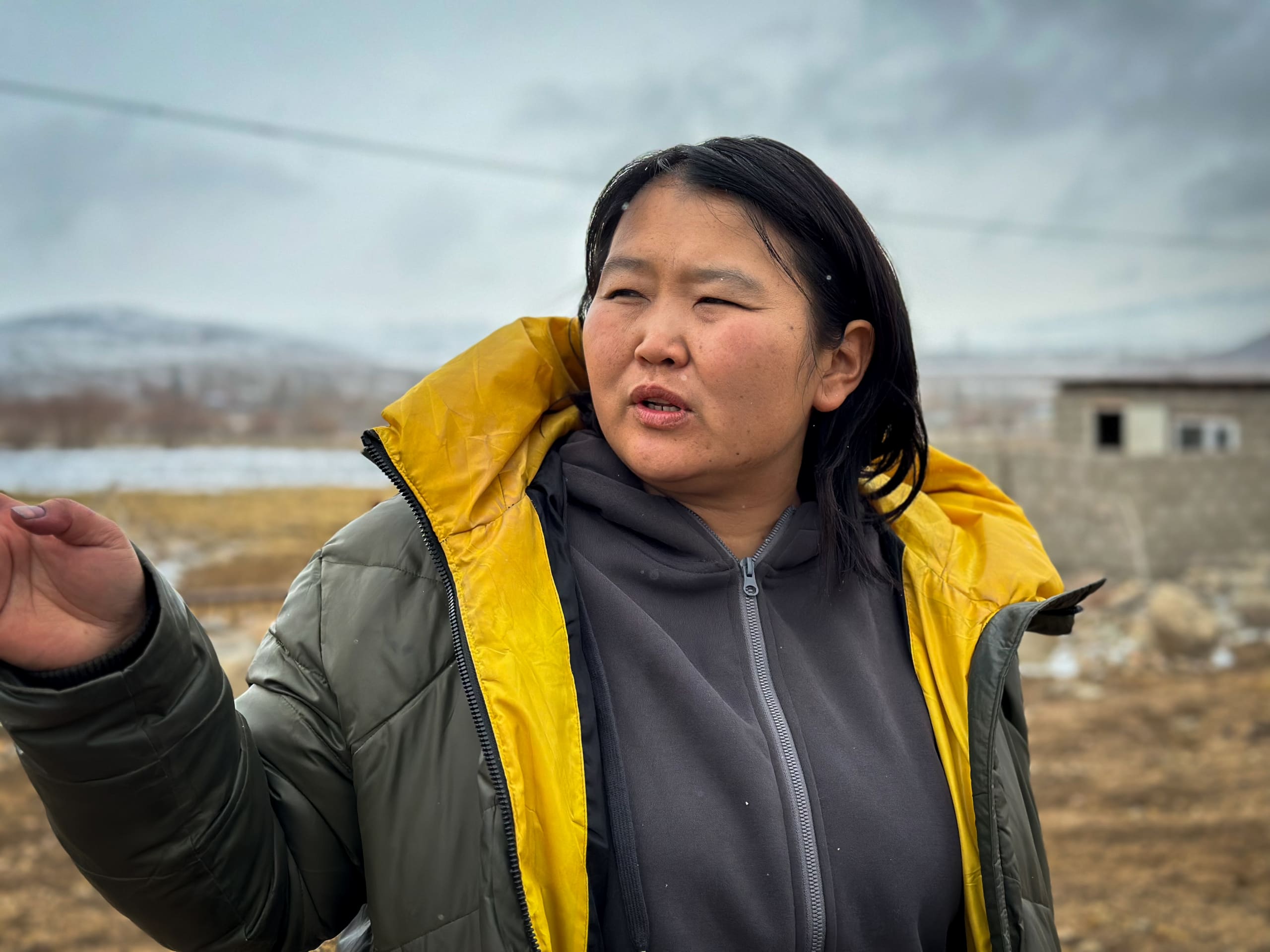
Building climate resilience: How eco-innovators are reducing water stress in the mountainous Kyrgyz Republic

“We haven’t run out of water, but we are going to”
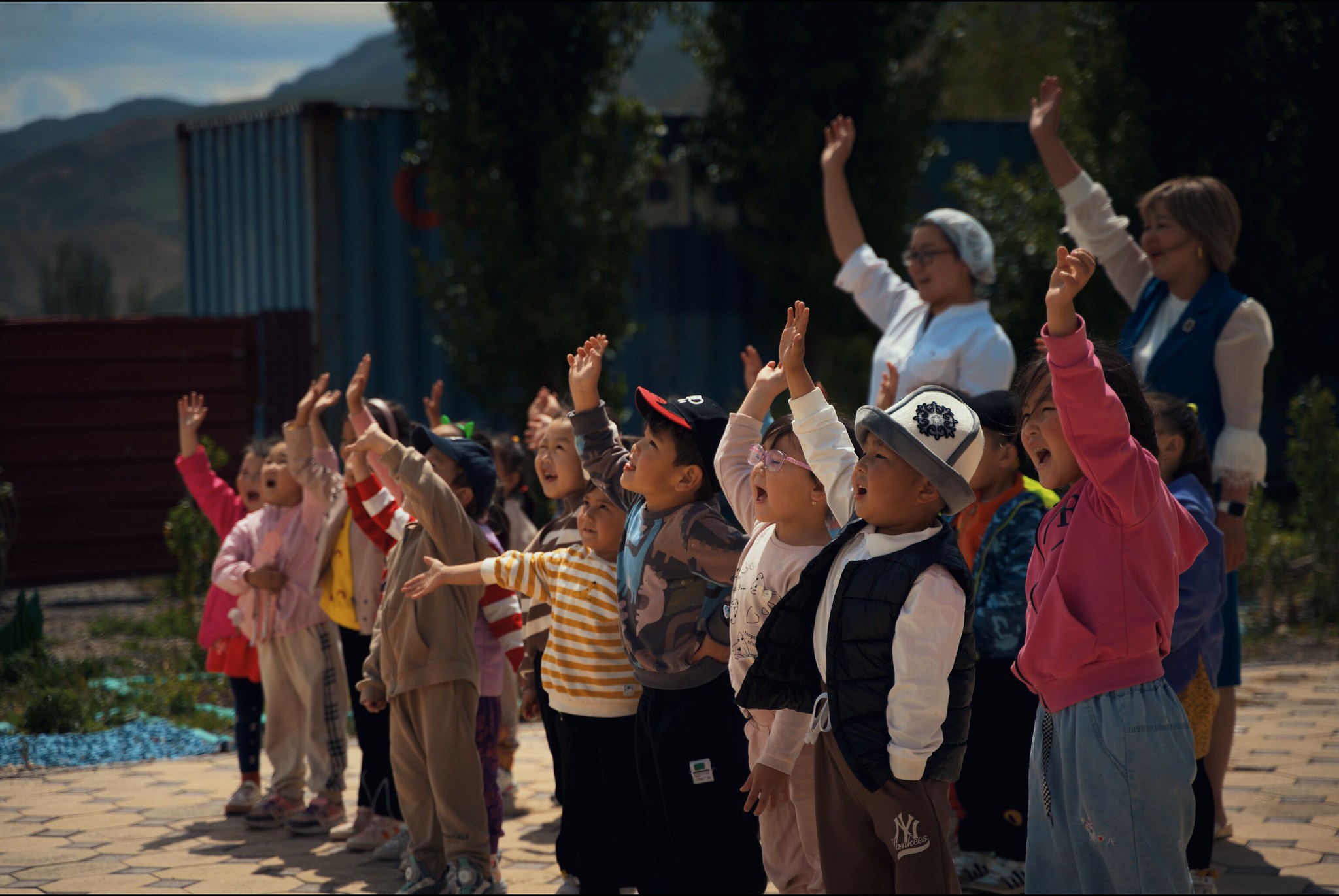
Schools2030 Kyrgyz Republic: A planet that needs our help
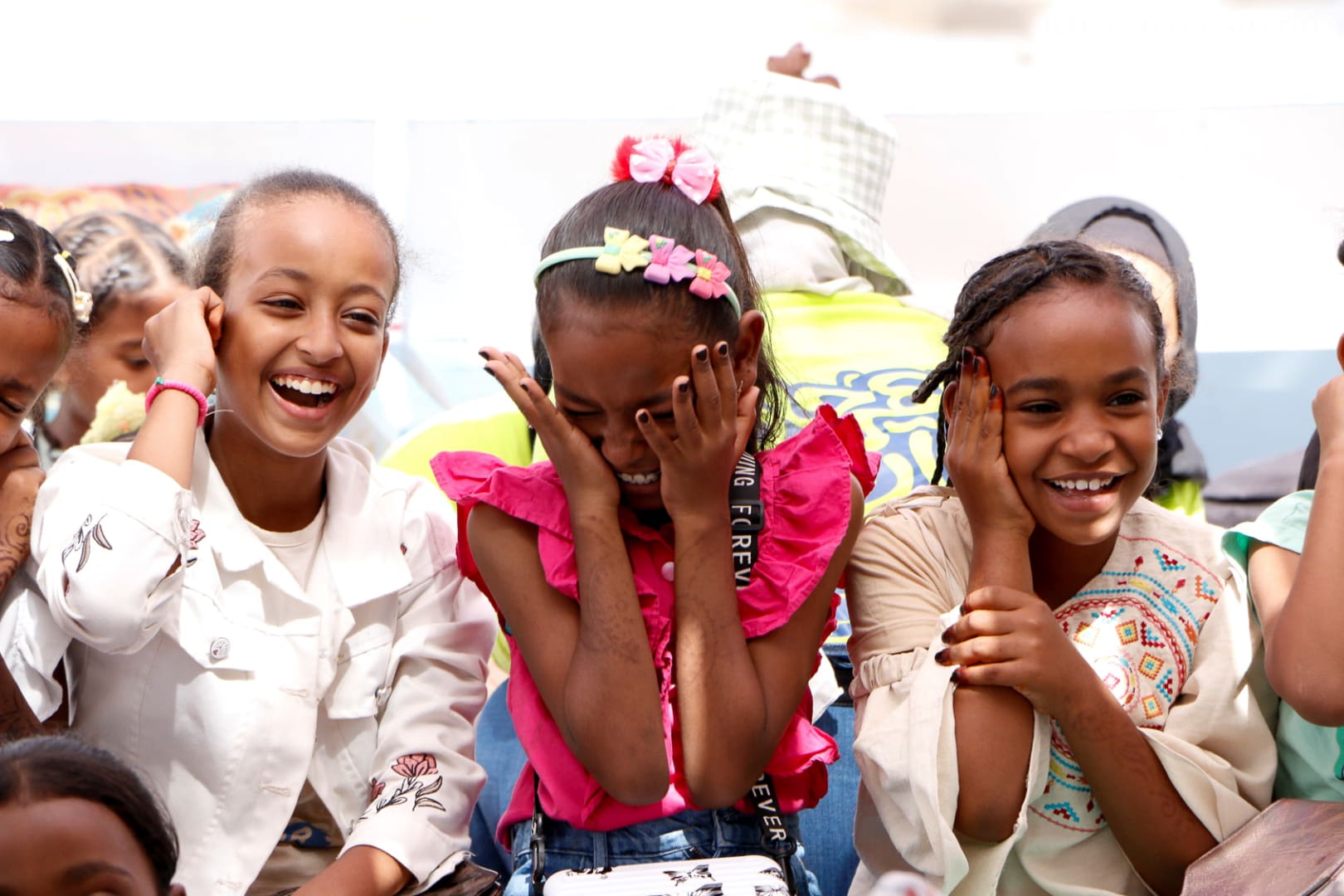
Support our work Your donations are helping us build a future where we all thrive together.

